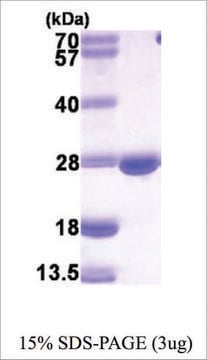37294
Dihydrofolate Reductase from bovine liver
~8 U/mL, ammonium sulfate suspension, off-white
Sinónimos:
Tetrahydrofolate Dehydrogenase
Iniciar sesiónpara Ver la Fijación de precios por contrato y de la organización
About This Item
Número de CAS:
MDL number:
UNSPSC Code:
12352204
NACRES:
NA.54
Productos recomendados
biological source
bovine liver
form
ammonium sulfate suspension
specific activity
≥6 U/mg protein
concentration
~8 U/mL
color
off-white
density
1.2 g/mL at 20 °C
storage temp.
2-8°C
Application
Dihydrofolate reductase (DHFR) is involved in the synthesis of purines, thymidine and glycine in folate metabolism. DHFR, from bovine liver, is used for methotrexate analysis . DHFR is useful to study various cancers such as sarcomas, leukemias and head and neck cancers .
Biochem/physiol Actions
Dihydrofolate reductase (DHFR) reduces dihydrofolic acid to tetrahydrofolic acid, using NADPH as an electron donor. The binding of antitumor agents, such as methotrexate, to DHFR prevents the formation of reduced folates, which are essential for DNA synthesis .
Unit Definition
1 U corresponds to the amount of enzyme which converts 1 μmol 7,8-dihydrofolate and NADPH to 5,6,7,8-tetrahydrofolate and NADP per minute at pH 6.5 and 25 °C
Physical form
Suspension in 3.6 M ammonium sulfate solution, pH 7.0
Other Notes
In folate metabolism for the synthesis of purines, thymidine and glycine
Sales restrictions may apply
Storage Class
10 - Combustible liquids
wgk_germany
WGK 3
flash_point_f
Not applicable
flash_point_c
Not applicable
ppe
Eyeshields, Gloves
Certificados de análisis (COA)
Busque Certificados de análisis (COA) introduciendo el número de lote del producto. Los números de lote se encuentran en la etiqueta del producto después de las palabras «Lot» o «Batch»
¿Ya tiene este producto?
Encuentre la documentación para los productos que ha comprado recientemente en la Biblioteca de documentos.
Use of dihydrofolate reductase from bovine liver, rather than from L. casei, for determining methotrexate.
R J Brooks
Clinical chemistry, 24(3), 518-519 (1978-03-01)
H B Eastman et al.
Proceedings of the National Academy of Sciences of the United States of America, 88(19), 8572-8576 (1991-10-01)
Dihydrofolate reductase (DHFR; EC 1.5.1.3) is required in folate metabolism for the synthesis of purines, thymidine, and glycine. Although there have been several reports of induction of DHFR enzyme by methotrexate (MTX), a drug that competitively inhibits DHFR, there are
Shimon Bershtein et al.
Molecular cell, 49(1), 133-144 (2012-12-12)
What are the molecular properties of proteins that fall on the radar of protein quality control (PQC)? Here we mutate the E. coli's gene encoding dihydrofolate reductase (DHFR) and replace it with bacterial orthologous genes to determine how components of PQC
Inbar Avraham et al.
Proceedings of the National Academy of Sciences of the United States of America, 109(52), E3678-E3686 (2012-12-01)
Plasmodium falciparum causes the deadliest form of human malaria. Its virulence is attributed to its ability to modify the infected RBC and to evade human immune attack through antigenic variation. Antigenic variation is achieved through tight regulation of antigenic switches
Luca Freschi et al.
Molecular bioSystems, 9(1), 36-43 (2012-10-27)
One of the most important challenges in systems biology is to understand how cells respond to genetic and environmental perturbations. Here we show that the yeast DHFR-PCA, coupled with high-resolution growth profiling (DHFR-qPCA), is a straightforward assay to study the
Nuestro equipo de científicos tiene experiencia en todas las áreas de investigación: Ciencias de la vida, Ciencia de los materiales, Síntesis química, Cromatografía, Analítica y muchas otras.
Póngase en contacto con el Servicio técnico








